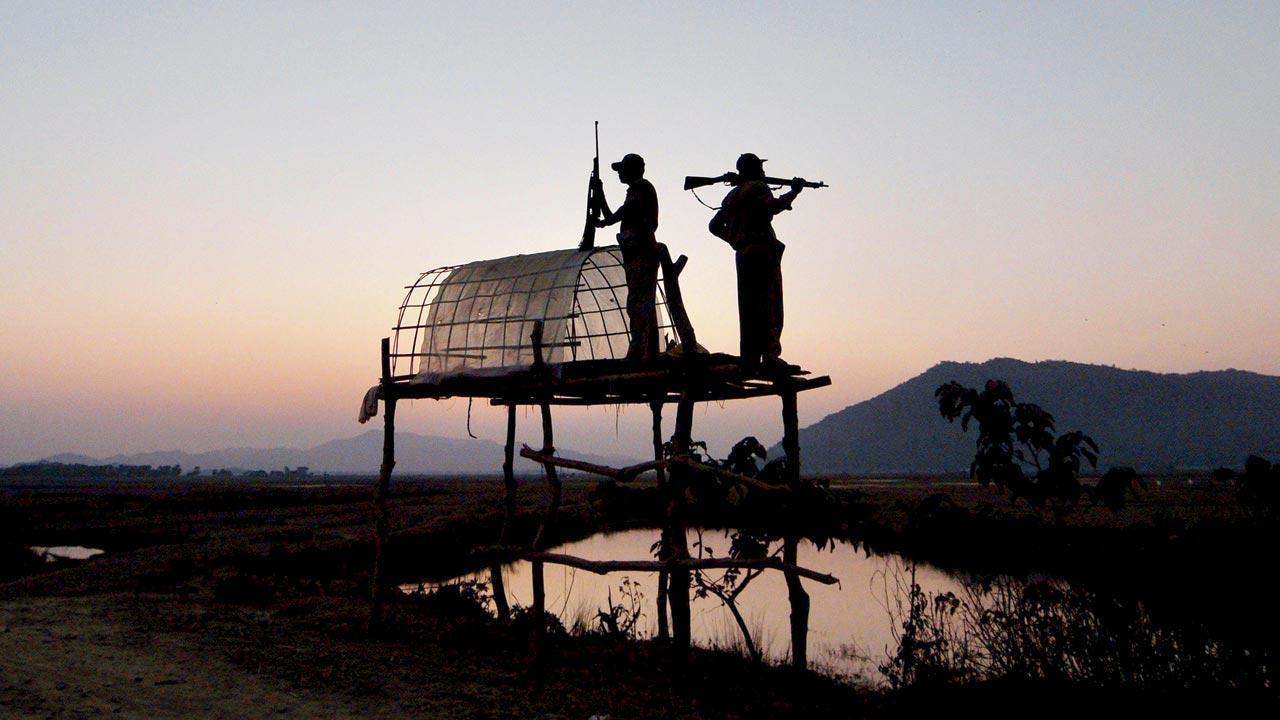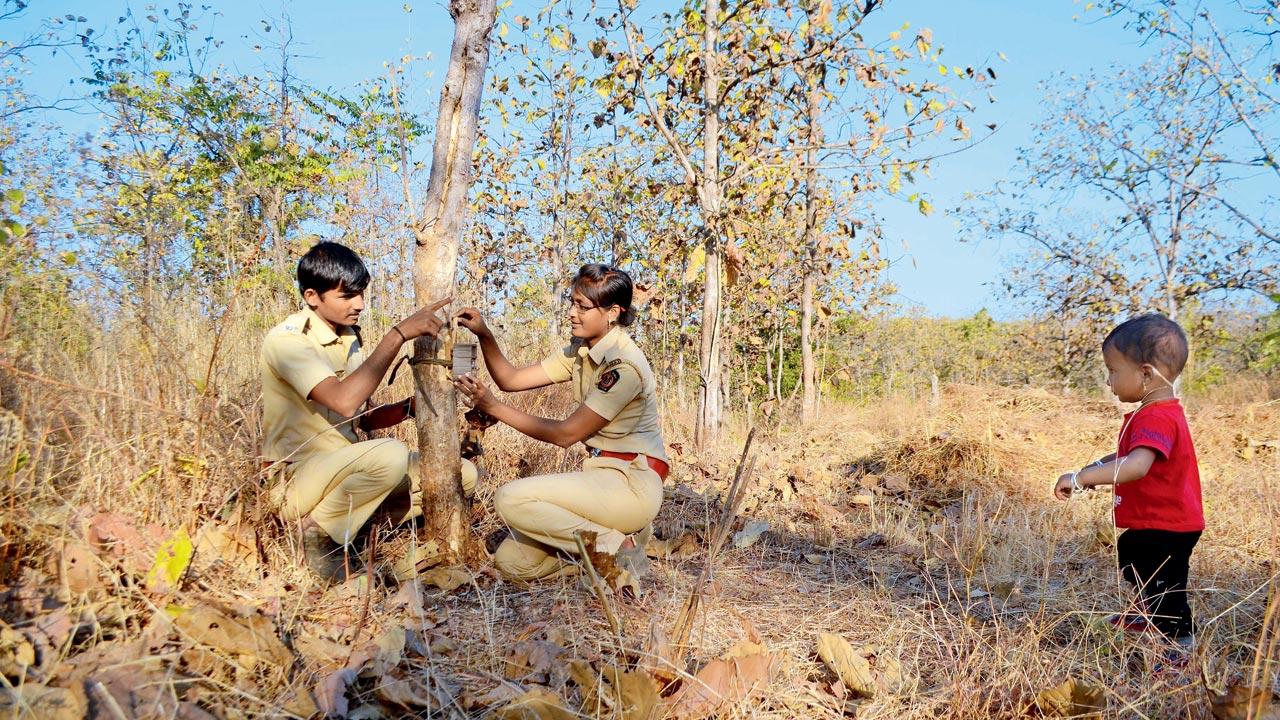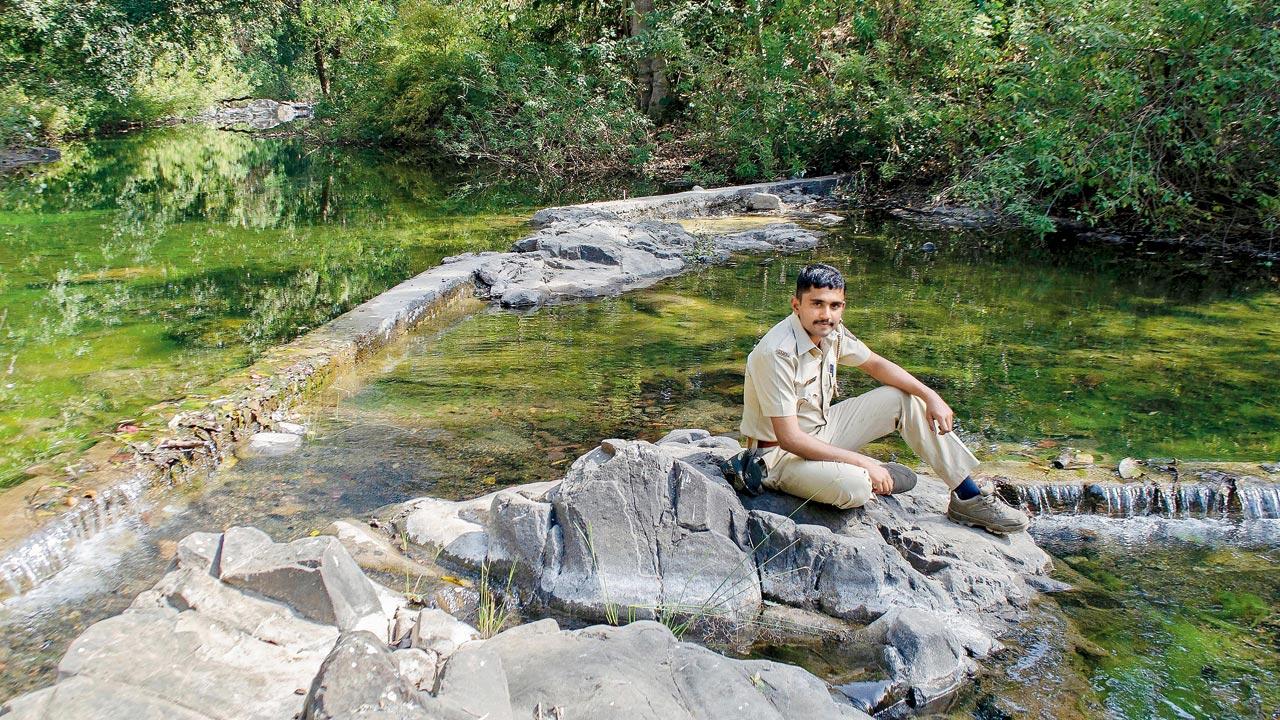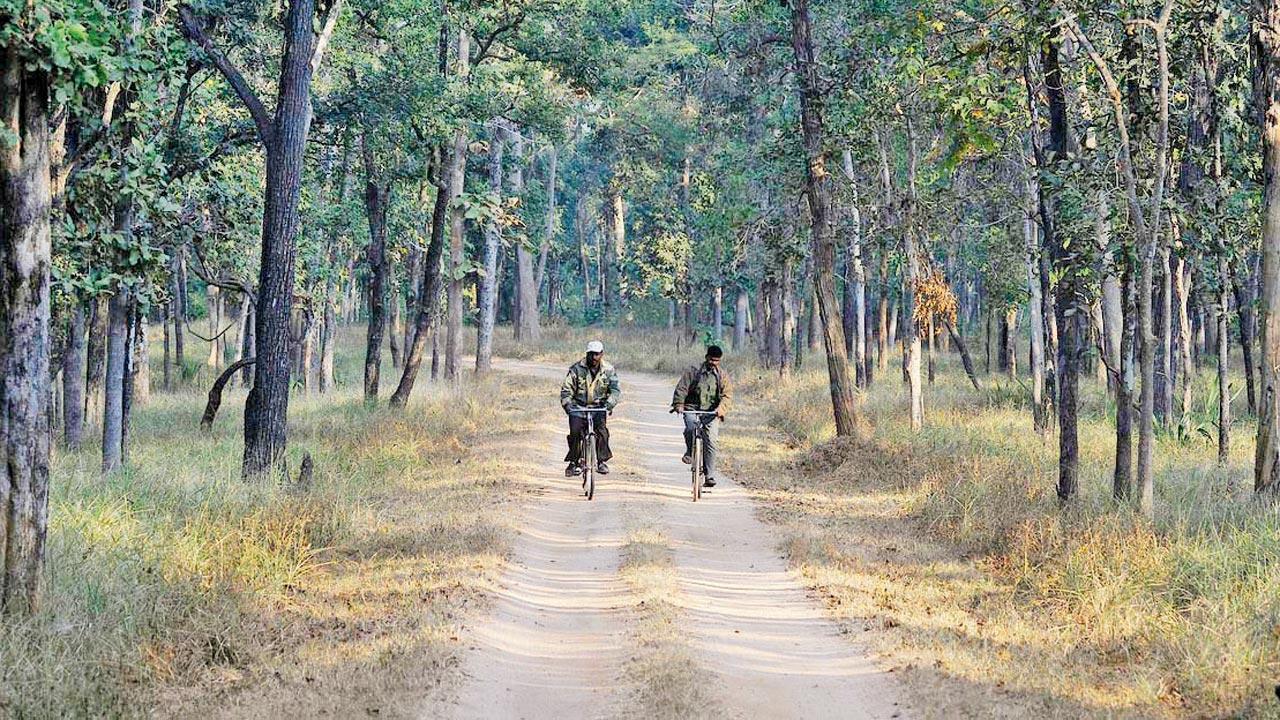Can forest guard couples with children continue to serve nature in the remotest parts of India’s tiger reserves? On World Ranger Day, Sunday mid-day makes a pitch for taking welfare to seclusion in a bid to continue to protect our natural heritage

Forest guards look out for the rhinoceros at a camp on the periphery of Pobitora Wildlife Sanctuary, Guwahati. A recent study explored how isolation in the forest affects the mental health of forest guards. Pic/AFP Via Getty Images
Log bolte the ki mat jao tiger reserve mein. Wahan bandar ke peene wala paani milega [People warned me not to opt for a tiger reserve posting... and that I would have to drink the same water that the monkeys do],” says Dinesh Balaji Kendre. But he made up his mind. From a comfortable posting in the Territorial Wing of the Maharashtra Forest Department in the Buldhana district of north Maharashtra, he sought a transfer to the Wildlife Wing in Koktu, one of most remote parts of the Melghat Tiger Reserve in Amravati district. This was back in 2017. A senior officer who was forwarding his application suggested that he reconsider because “most people wait years to bag a comfortable posting”. His wish was granted within a month. Kendre found himself in the Dhargad Range in the core zone of Melghat.
ADVERTISEMENT
A wildlife sanctuary since 1967 and declared a tiger reserve in 1974, Melghat sits 225 km from Nagpur.

Forest guard couple, Sunita and Dnyaneshwar Shinde, install a camera trap while their child looks on. The couple was assigned the charge of adjacent beats in the core zone of Melghat Tiger Reserve. They would take four-day turns to patrol their beats and babysit their boy. In 2019, they managed a posting at the more accessible Lonar Wildlife Sanctuary in Buldhana. Pics Courtesy/Rizwan Mithawala, The Wildlife Conservation Trust
“Wahan [Territorial Wing] sirf office work tha, aur yahan din bhar jungle mein ghoomna, wildlife ke liye kaam karna hai,” he says, walking past a stream on which he has built a series of small dams, each overflowing into the next, to make water available for the animals through the dry months by slowing down the flow while recharging the ground water table. As we walk, we encounter the scat (excreta) of a tiger. “Yahan aane se pehle maine tiger ko sirf TV pe dekha tha. Ab woh apni beat mein hain, apne bandhaare par paani peete hain [I had seen tigers only on television; now they roam my beat, drink from the small dams I have built].”
We had this chat in December 2018. Kendre was 23 then, and single. Last month, when we connected, he said he was on the same beat, maintaining waterholes and small check-dams, patrolling and propagating grass that’s palatable to wild herbivores. Except that now he is joined by his wife Anita and their 19-month-old son, Yash. She, too, is a forest guard posted in Melghat, her beat sits just 5 km from his. They are raising their child in the forest for now. In another three years, his schooling will demand that they seek a transfer outside the tiger reserve. “Bachhe ka bachpan doosre bachhon ke saath mein hona... job ke liye uska bachpan nahin khone ko hona [Our son should enjoy a normal childhood in the company of other kids],” Kendre says.

Forest guard Dinesh Kendre sits by the stream on which he has made a series of small dams to make water available for wildlife through the dry months
Guards like Dinesh are critical to protecting our wildlife and its eco-system, the foot soldiers in every sense in our battle against environment and wildlife degradation. Their responsibilities are wide ranging, and cover fire control, managing human-animal conflict or interface, water resource maintenance, monitoring animal species numbers, keeping a watch for illegal trade among others.
Sunita and Dnyaneshwar Shinde are batchmates turned colleagues turned life-mates. Assigned the charge of adjacent beats, they too were raising their one-year-old son, Samarth, in the core zone when I visited Melghat in 2018. They would take four-day turns to patrol their beats and babysit their boy. I accompanied the family to install a camera trap in Sunita’s beat, keeping an eye on their little boy as they tested and fastened a camera trap on a tree trunk. On our way back, I took pictures of the family. The couple, walking the forest trail in crisp khaki uniforms, toddler in tow, made the perfect picture of harmony between man and nature. It seemed ideal, perhaps too perfect. Sunita said she would hate to leave but may have no choice.

A forest guard on patrol in Sahyadri Tiger Reserve, Maharashtra. Forest guards working in the Wildlife Wing, especially those posted in tiger reserves, live in isolation with little or no human contact. They have to endure extreme weather conditions, brave the risk of confrontation with poachers, timber mafia, the occasional animal attack, and diseases such as malaria and tick fever. A recent study conducted by the Wildlife Conservation Trust explored how being isolated in the forest often affects the mental health of these guards. The report recommended that centrally located staff colonies be developed for the families of forest guards on the lines of police colonies that exist across India. Pics Courtesy/Anish Andheria
A year later in 2019, Dnyaneshwar and Sunita managed a posting at the Lonar Wildlife Sanctuary in Buldhana, a tourist place with better internet and mobile connectivity, with the couple having access to the amenities a family needs. That they were now in a place where Samarth could go to school was a relief. The turn that the lives of the Sindhes and Kendres took is typical of what most forest guard couples face when posted in tiger reserves across India.
The Wildlife Conservation Trust (WCT), a non-profit that focuses equally on wildlife protection and community development, has been making efforts over the last decade to improve the living and working conditions of frontline forest staff. In 2019, turning a page, WCT’s Conservation Behaviour (CB) Team completed two studies, in Madhya Pradesh and Maharashtra, to assess work environment, satisfaction and the psychological well-being of forest guards posted in the states’ tiger reserves. Covering 500 guards across the two states, the study involved interviews conducted at the guards’ anti-poaching camps (APCs), as well as image-based implicit association tests, under the guidance of Professor Vivek Belhekar, from the department of Applied Psychology at the University of Mumbai.

Forest guards on patrol in Pench Tiger Reserve, MP. While pay structures across the various wings of the Forest Department are uniform and the opportunities for a promotion are equal, there is marked disparity in work profiles
The team learned that the cultural considerations for choosing to work as a guard vary greatly across the two states. A government job is extremely aspirational, and in some cases a prerequisite for marriage in Madhya Pradesh, whereas in Maharashtra this is no longer the case. The measures undertaken by the various tiger reserves also vary. Among others, two initiatives that have improved the living and working conditions at the anti-poaching camps were highly appreciated by forest staff—a 2.5Kw solar power set up at the Satpura Tiger Reserve in Madhya Pradesh, and WiFi connectivity at Melghat in Maharashtra.
On the basis of the surveys, the team made specific policy and management recommendations with specific attention on staff accommodation, improving facilities inside APCs, human resource management and training, financial incentives, safety and psychological health. Mental health plays a primary role in maintaining high motivation, making them effective protectors of India’s natural heritage.
“The work of the entire forest department is challenging; and guards are the frontline workers who play the most important role in protecting the wildlife and the ecosystem. It is vital to understand their needs, and design policies that take into account psychological factors such as motivation, wellbeing, and satisfaction, to promote a healthy work environment,” says social psychologist Prachi Paranjpye from the CB team.
“Our study highlights the mental health impact of protecting biodiversity. Nowhere else in the world has such an extensive outreach for rangers been executed focusing on their psychological wellbeing; and it is only apt that it is happening in India, as we account for maximum ranger deaths according to the International Ranger Federation. This makes it extremely important that we take steps to enhance their psychological wellbeing,” says economist Aniket Bhatkhande, who heads the CB team.
One of the key insights to have emerged from the study was the inability of the forest guards to be with, and care for their families, or ensure the progress of their children. This appeared as a factor for frustration among this group. The report recommended that centrally located staff colonies be developed for the families of forest guards on the lines of police colonies that exist across India; that every tiger reserve have access to education till the higher secondary level, and that the guards and their families be assured of healthcare.
While pay structures across the various wings of the Forest Department are uniform and the opportunities for a promotion are equal, there is marked disparity in work profiles. Forest guards working in the Wildlife Wing, especially those posted in tiger reserves, live in isolation with little or no human contact. They must endure extreme weather conditions, brave the risk of confrontation with poachers, timber mafia, the occasional animal attack, and diseases such as malaria and tick fever. According to WCT’s health needs assessment of forest guards from tiger reserves across Central India, the average distance that a forest guard must travel to seek definitive care (treatment required to conclusively manage a medical condition) for major health emergencies like a fit or seizure, serious injuries, animal attacks, poacher assaults, major accidents, and heart attacks is over 30 km. The work motivation report recommends that forest guards be trained in basic first aid and that dysfunctional equipment be promptly replaced.
With regard to financial incentive to work in isolating and challenging conditions, the report recommends instituting a special wildlife allowance for guards posted in tiger reserves. To improve their sense of achievement, awards and recognition by supervisors, accorded in social settings, has also been recommended.
I once met a guard in the Pench Tiger Reserve who was fond of photography. Close to his quarters stood a tree that would be festooned with parakeets every morning and evening. As I praised some of his best bird images, he said, “Yahan to koi dekhne wala bhi nahin hai [There is nobody here to see, and appreciate].”
The author of this article is a conservation writer with the Wildlife Conservation Trust and Fellow of the International League of Conservation Writers
30
Distance in km that a forest guard in tiger reserves across Central India must travel to access definitive medical care for emergencies, according to WCT’s health needs assessment report
World Ranger Day
World Ranger Day is celebrated worldwide on July 31 to commemorate rangers killed or injured in the line of duty, and to celebrate their work in protecting the planet’s natural treasures and cultural heritage.
 Subscribe today by clicking the link and stay updated with the latest news!" Click here!
Subscribe today by clicking the link and stay updated with the latest news!" Click here!







